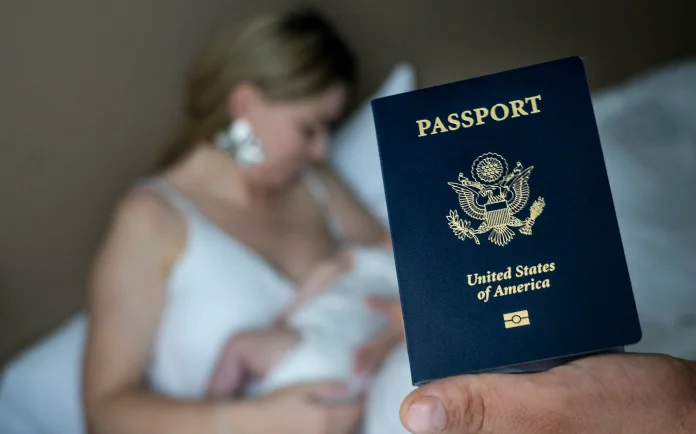Birth tourism is a growing phenomenon where expectant mothers travel to foreign countries to give birth, aiming to secure citizenship for their newborns. One notable case that drew international attention occurred in October 2015. A Taiwanese woman, identified as Jian, gave birth prematurely on a China Airlines flight from Taipei to Los Angeles. The viral video of this incident in 2025 sparked debates about the ethical and legal implications of birth tourism.
What Happened on the Flight?
About six hours into the flight, Jian unexpectedly went into labor. The flight crew, with the help of a doctor on board, assisted her in delivering a healthy baby girl. Given the urgency of the situation, the crew decided to divert the flight to Anchorage, Alaska, to ensure both the mother and child received immediate medical attention.
However, upon arrival in the U.S., immigration officials denied Jian entry. As a result, she was deported to Taiwan without her newborn daughter, who remained in the U.S. under the care of a friend. This dramatic series of events highlighted significant issues related to birth tourism and immigration policies.

The Controversy Around Birth Tourism
Jian’s case sparked controversy for several reasons. Reports suggested she may have concealed her pregnancy to avoid the airline’s regulations. China Airlines requires a medical certificate from women who are more than 32 weeks pregnant. Jian allegedly claimed to be less than 32 weeks along, thereby bypassing the need for documentation.
Critics argued that Jian’s actions could be part of a broader trend of exploiting legal loopholes to secure citizenship for children born in countries with birthright policies, such as the U.S. This raised ethical concerns and led to discussions about potential legal consequences for passengers who mislead airlines and immigration authorities.
The Financial Impact on Airlines
Flight diversions are costly. In this case, China Airlines faced significant expenses due to the unplanned stop in Alaska. Reports indicated that the airline considered legal action against Jian to recover the financial losses.
When a flight diverts, airlines must account for fuel, landing fees, crew overtime, and compensation for inconvenienced passengers. Birth tourism-related incidents can create logistical and financial burdens on airlines, prompting them to tighten their policies.
Legal and Ethical Questions
Birth tourism raises several legal and ethical questions.
- Is it ethical to travel abroad with the sole intention of giving birth? Critics argue that this practice manipulates immigration systems and places undue pressure on public resources.
- Should airlines have stricter pregnancy screening measures? Some airlines have already implemented stringent policies requiring advanced medical certificates and documentation.
- Who bears responsibility for the costs incurred? In Jian’s case, China Airlines faced financial losses, but some argue that the passenger should be held accountable for misleading the airline.
Birth Tourism: Impact on Immigration Policies
Jian’s case renewed focus on immigration policies in countries like the U.S., which grant citizenship to anyone born on their soil. Known as “jus soli” or birthright citizenship, this policy can incentivize birth tourism.
In response to increasing birth tourism cases, the U.S. has explored tightening visa regulations for pregnant women. Other countries, like Australia and Canada, have also faced similar challenges and discussions about revising their birthright citizenship policies.
Airline Policies and Future Measures for Birth Tourism
Following incidents like Jian’s, many airlines have reviewed and updated their policies regarding pregnant passengers. Most airlines now require women beyond a certain stage of pregnancy to provide medical clearance. Some carriers even conduct physical checks at boarding gates to prevent incidents that could lead to costly diversions.
China Airlines reiterated its commitment to enforcing policies strictly after this case. The airline emphasized that passengers who provide misleading information could face legal consequences and be held liable for any resulting costs.
The Debate in Taiwan
Jian’s case also sparked debates in Taiwan. While some sympathized with her, others criticized her actions for potentially damaging Taiwan’s reputation. The case fueled broader discussions on birth tourism and how governments should respond to citizens engaging in such practices.
You might also like: Why You Should Ditch Warm Water and Sip Room Temperature Water This Winter ❄️💧
Taiwanese authorities have since worked to raise awareness about the risks and legal ramifications of birth tourism. Some officials advocated for better cooperation with international airlines to prevent similar incidents.
You might also like: Blake Lively and Justin Baldoni Legal Battle: A Timeline of Events
Birth Tourism
Birth tourism remains a contentious issue globally. While some view it as a legitimate means to secure a better future for their children, others see it as an exploitative practice that undermines immigration policies and burdens airlines. The case of Jian serves as a reminder of the complexities surrounding this issue, prompting discussions on legal reforms, airline policies, and ethical considerations.
FAQs
1. What is birth tourism?
Birth tourism refers to the practice of traveling to another country to give birth, allowing the child to obtain citizenship in that country.
2. Why was Jian deported from the U.S. without her baby?
U.S. immigration officials denied her entry, likely due to concerns over visa violations or deceptive travel practices. Her baby, born on U.S. soil, was allowed to stay.
3. Do airlines have rules for pregnant passengers?
Yes, most airlines require a medical certificate if a passenger is beyond 32 weeks pregnant. Some airlines have even stricter policies.
4. Can airlines take legal action against passengers for flight diversions?
Yes, airlines can seek compensation from passengers who cause diversions through misleading information or actions that result in significant costs.


